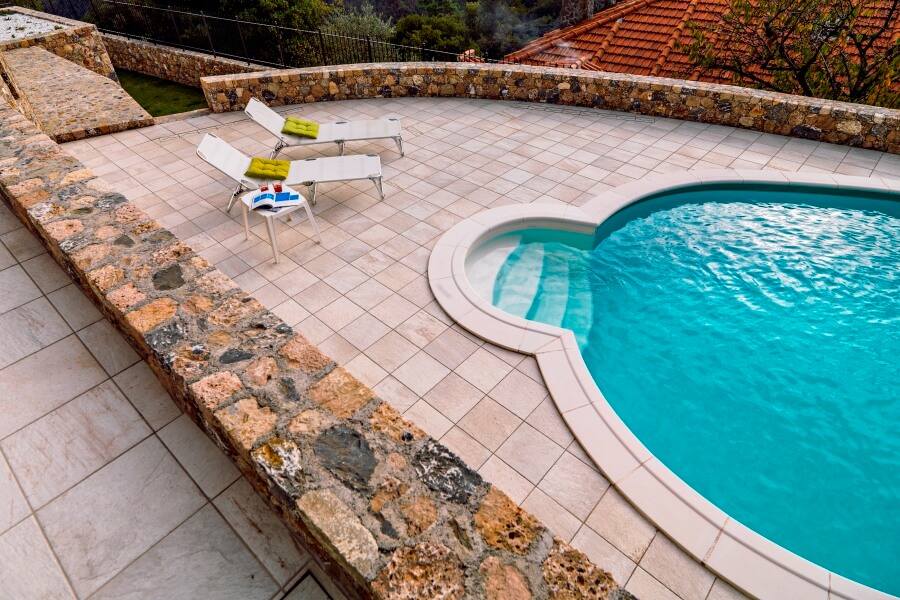Ultimately, the choice of pool material should be based on your specific needs, preferences, and budget. Consider factors such as durability, maintenance requirements, design options, and long-term costs to make an informed decision that will best suit your swimming oasis.
By carefully evaluating these aspects, you can ensure that your chosen pool material aligns with your desired aesthetics, functionality, and investment value. Whether you opt for the durability of fiberglass, the affordability of vinyl liner pools, or the flexibility of concrete, selecting the right pool material is a crucial step towards creating the perfect swimming oasis that you and your family can enjoy for years to come.
A Quick Brief on Pool Materials
- Fiberglass material pools stand out for their durability and low maintenance requirements, making them an excellent choice for those seeking convenience and longevity.
- Vinyl liner material pools, on the other hand, provide affordability and customizable designs, allowing homeowners to create a personalized swimming oasis without breaking the bank.
- Concrete material pools, with their flexibility and long lifespan, offer a versatile option for those looking for a pool that can withstand various climates and design preferences.
“Investing in a well-designed and well-maintained pool can enhance the value of your property and attract potential buyers. However, it’s essential to understand the preferences of the local market and the resale value associated with different pool materials.” – Real Estate Expert, Jane Thompson
As real estate trends change and people modernize their lifestyles, this significant shift can help your property stand out indefinitely in the real estate industry. This evolving change primarily makes things digitally accessible for visual appeal before buyers and sellers visit any property. To stay competitive, you must consider your property immediately, especially if you live in Canada, as emerging trends can quickly overshadow your property. We believe a well-maintained pool is a highly attractive feature for any well-rounded property.
Understanding Fiberglass Pools
Fiberglass pools have emerged as a popular choice among homeowners, and it’s no wonder why. They are tough, need little upkeep, and offer plenty of perks. Made from a sturdy fiberglass shell, they’re strong and flexible, resisting corrosion. Plus, the smooth gelcoat finish stops algae and cuts down on maintenance and chemicals, giving you years of hassle-free swimming.
The installation of fiberglass pools involves excavating the area, placing the pool shell, and backfilling around it. Because fiberglass pools come pre-formed, the process is usually faster than with other materials. This means homeowners can start enjoying their pools sooner.
| Advantages | Disadvantages |
| Faster Installation | Not Available for DIY Projects |
| Algae-resistant | Get Osmotic Blisters |
| Increase Home’s Resale Value | Size and Shape Limitations |
| Rarely Need Resurfacing | Expensive Installation |
Now that we have explored fiberglass pools extensively, let’s move on to the next section and delve into the realm of vinyl liner pools.
Understanding Vinyl Liner Pools
When considering swimming pool materials, vinyl liner pools are notable for their affordability and customizable designs. The construction process involves excavating the area and constructing a steel frame, reinforced with concrete footings or walls. A vinyl membrane is then installed as the pool’s interior lining, providing a smooth and appealing surface while holding the water. Vinyl’s flexibility allows for a range of shapes and sizes, facilitating customization according to preferences.
Advantages and disadvantages of vinyl liner pools will be explored next.
| Advantages | Disadvantages |
| Budget-friendly | Higher Lifetime Costs |
| Customizable design options | More Susceptible to Algae Growth |
| Smooth and non-abrasive surface comfort | Need Replacement Every Decade |
| Low Maintenance | Shorter Lifespan |
Vinyl liner pools present an affordable and customizable choice for homeowners seeking to realize their dream swimming oasis.
Understanding Concrete Pools
Concrete pools offer abundant opportunities for creativity and customization. With concrete, you have the freedom to design a pool that perfectly suits your space and vision. These pools are incredibly versatile, allowing for unique features such as built-in waterfalls, beach entries, and distinctive architectural elements. You can finish the surface with various materials like pebbles or tiles, creating a personalized look that matches your aesthetic preferences.
When choosing a pool material based on design and aesthetics, it’s crucial to align your choice with your desired look, whether it’s sleek and modern, natural and organic, or custom and artistic.
Concrete pools have several advantages over other materials, providing a sturdy foundation for adding unique features and accessories. However, it’s essential to consider potential drawbacks. The porous nature of concrete may lead to more frequent algae growth and require regular maintenance.
| Advantages | Disadvantages |
| Durable and long-lasting | Long construction process |
| Customizable design options | Higher maintenance requirements |
| Ability to add unique features | Higher initial cost |
With proper construction and maintenance, a well-built concrete pool can easily last for several decades, depending on the quality of construction and level of upkeep.
Long-term Pool Material Performances
Each pool material has its strengths and weaknesses in terms of durability and lifespan. It’s crucial to carefully consider the long-term performance and maintenance requirements when selecting a pool material that suits your specific needs.
When examining the durability and lifespan of the three pool materials, we can summarize the findings in the following table:
| Aspect | Vinyl Liner Pools | Fiberglass Pools | Concrete Pools |
| Cost | Affordable | Moderate | Expensive |
| Customization | Extensive options | Limited | Flexible |
| Surface Comfort | Smooth | Smooth | Variable |
| Lifespan | 10-15 years | 25+ years | Long-lasting |
| Maintenance | Easy | Minimal | High |
Overall, fiberglass pools typically offer the highest durability and longest lifespan among the three materials. However, individual preferences, budget constraints, and maintenance considerations should also play a role in the decision-making process.
After examining the characteristics, durability, maintenance, design, and cost of fiberglass, vinyl liner, and concrete pools, it’s clear that each material has unique advantages and considerations. As Pool Installers, we specialize in designing pools tailored to our clients’ needs. If you’re interested in custom pool design and reside in the Greater Toronto Area, give us a call at (647) 812-7736. We’re dedicated to helping you achieve your dream pool.
Common Upkeep Considerations
Proper maintenance is essential for preserving the longevity and functionality of your pool. Each pool material – fiberglass, vinyl liner, and concrete – has its unique maintenance requirements and considerations. Alongside routine upkeep, there are several factors to bear in mind regarding overall pool maintenance:
- Cost of Upkeep: Different pool materials entail varying upkeep costs, including chemical treatments, repairs, and water consumption. Consider these long-term expenses when selecting a pool material.
- Resurfacing and Replacement: Over time, all pool materials may require resurfacing or liner replacement. Understanding the frequency and cost of these procedures helps you plan for future maintenance.
- Seasonal Maintenance: Pool maintenance needs can vary seasonally based on your climate. From winterizing your pool to ensuring proper water circulation during hot summers, adjust your maintenance routine accordingly.
Regular maintenance and timely upkeep are vital for ensuring your pool remains in optimal condition, providing a clean and enjoyable swimming experience for years to come.
FAQS
What are the three most popular pool materials?
Fiberglass, vinyl liner, and concrete are the three most popular pool materials.
What are the characteristics of fiberglass pools?
Fiberglass pools are known for their durability and ease of maintenance.
What are the pros and cons of fiberglass pools?
Pros include durability, low maintenance, and a smooth surface. Cons include limited design options and a higher initial cost.
What design options are available for fiberglass pools?
Fiberglass pools offer a limited range of shapes and sizes.
What are the characteristics of vinyl liner pools?
Vinyl liner pools are affordable and offer customizable designs.
What are the benefits and drawbacks of vinyl liner pools?
The benefits of vinyl liner pools include affordability, resistance to algae growth, and smooth surface. Drawbacks include vulnerability to tears and punctures, as well as the need for periodic liner replacement.
What design options are available for vinyl liner pools?
Vinyl liner pools offer more flexibility in design, allowing customization of the liner pattern.
What are the characteristics of concrete pools?
Concrete pools are known for their flexibility and long lifespan.
What are the advantages and disadvantages of concrete pools?
The advantages of concrete pools include unlimited design possibilities, durability, and the ability to customize the shape and size. The disadvantages include higher maintenance requirements and longer construction time.
What design options are available for concrete pools?
Concrete pools offer unlimited design possibilities, allowing for unique shapes, custom features, and finishes.
How do the durability and lifespan of the different pool materials compare?
Fiberglass pools have excellent durability and can last for several decades. Vinyl liner pools have a moderate lifespan, typically requiring liner replacement every 10-15 years. Concrete pools are extremely durable and can last for many years with proper maintenance.

